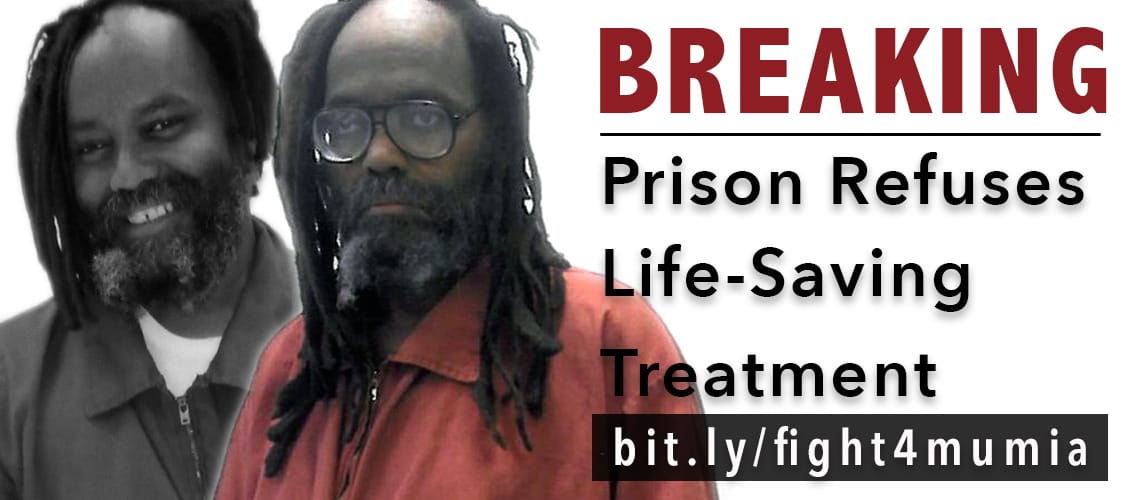by Ann Garrison
KPFA Weekend News broadcast June 21, 2015
KPFA Weekend News Anchor Anthony Fest: Attorneys filed lawsuits in Pennsylvania and Massachusetts this week on behalf of prisoners who say they’re being denied new lifesaving treatment for Hepatitis C because of the cost of the drugs. Gilead Sciences manufactures two versions of the cure, Harvoni and Sovaldi. Abbvie Pharmaceutical Limited, formerly Abbot Labs, manufactures another, Viekira Pak. The cost of any one of the three is roughly $90,000.

Hepatitis C is a liver disease caused by a virus, which irreversibly destroys the circulatory system, digestive system and liver, leading to cancer, cirrhosis and liver failure. KPFA’s Ann Garrison spoke to attorney Peter Erlinder, who sued the Minnesota Department of Corrections on behalf of two prisoners there several weeks before attorneys filed this week’s similar lawsuits in Pennsylvania and Massachusetts. Here’s that conversation.
KPFA/Ann Garrison: Peter Erlinder, could you first explain the basics of the breakthrough cure for Hep C? Is it just an orally administered medication, or is the treatment more complex?
Peter Erlinder: Well, it’s really quite remarkable. It’s a very simply administered drug. It’s one pill a day for approximately 12 weeks. With that, the Hepatitis C virus is cleared from the body, irrespective of the degree of viral load that existed beforehand.
So it’s not necessary to limit the drug just to the most severely infected. It could be given to anyone with Hepatitis C, and it will cure in that the virus will be eliminated from the bloodstream. Now it’s not a vaccine, but for the first time, also, the interferon is no longer part of the treatment, which had very serious side effects and caused some people to decide not to take the treatment because it was really a brutally debilitating treatment that lasted a year in many cases. That’s gone now.
KPFA: Does one of these three drugs involve interferon?
Erlinder: Well, initially, the Sovaldi, which was the first drug that was approved, in late 2013, required weekly injections of interferon, at a lower level than previously, and it was successful in 12 weeks. But Harvoni and Viekira Pak, both of which were approved in late 2014, eliminate the use of interferon completely. So, this is a spectacular development, and the cure for Hepatitis C has been of course approved by the VA, by the CDC.
The Federal Bureau of Prisons is treating its inmates and the state of California has begun a small program, but most state prison systems have not begun treating inmates, although it is available through the Medicare and Medicaid systems in a limited way in many states.
Attorneys filed lawsuits in Pennsylvania and Massachusetts this week on behalf of prisoners who say they’re being denied new lifesaving treatment for Hepatitis C because of the cost of the drugs.
KPFA: Can you tell us why a 12-week cure costs an estimated $90,000? Is this because profit-driven pharmaceutical companies have to recoup their research costs, or is there something this costly about the process of manufacturing and administering the treatment?
Erlinder: No, it’s a case of monopoly pricing. The cost of manufacturing the drug, I understand, is really quite inexpensive. It’s being offered in other countries for a much lower price. In Egypt I think the course of treatment is about $900. Each dose can be manufactured for less than a dollar, I understand.
So this very expensive pricing is monopoly pricing, and whether it’s necessary to recoup investments or just a natural consequence of the capitalist system, it’s hard to say, but it certainly makes it difficult for patients to get the drugs that they need.
KPFA: Is the cure being offered for $900 in Egypt the same cure, or is this something manufactured by a different company?
Erlinder: It’s essentially the same drug manufactured by a different company. And of course the pharmaceuticals of a similar nature are being manufactured in India and other countries as well. But the products manufactured by Gilead Sciences and by AbbVie are also being matched by other manufacturers that are coming into the market in the U.S., but they also are anticipated to keep their prices quite high simply because they can.
And there’s been talk – Bernie Sanders, for example, has talked about attacking the problem by making this some sort of a national emergency and taking the profit margin out of the distribution of the drug. Not sure that that’s going to happen anytime soon, but it is an example of how quickly a medication can solve a huge national epidemic.
Somewhere in the neighborhood of 5 million people have Hepatitis C and many of them are dying of it. This is really a situation where the profit margin of drug companies comes up against the needs of the society.
KPFA: One of the most shocking claims in your press release about the Minnesota case was that the plaintiffs were infected a long time ago because of unsanitary conditions in Minnesota prisons, and now they’re being denied care.
Erlinder: Both of the main plaintiffs in our lawsuit, Ronald Wiggins and Mr. Michaelson, were infected in the prison system after they were convicted of their offenses – Mr. Wiggins because he has diabetes, and Mr. Michaelson because he was forced to clean up after a Hep C infected inmate who was his cellmate. And now both of them are being denied the new treatment that could cure them.
Both of the main plaintiffs in our lawsuit were infected in the prison system after they were convicted of their offenses.
KPFA: So, you say one prisoner got it because he has diabetes, and therefore he was injected, in some sort of unsanitary injection conditions. And the other had to clean up after a prisoner who was …
Erlinder: Who had Hepatitis C and had hemorrhaged. And it’s against prison regulations to force a prisoner to do that, but he was forced to do it nonetheless.
KPFA: Does the Minnesota Department of Corrections acknowledge responsibility for their infection?
Erlinder: No, they don’t acknowledge responsibility and they don’t acknowledge that either of these inmates qualifies for treatment with the new drugs. Their statement is that inmates have access to the medication, but the access doesn’t include any prisoners actually getting the medication. The access is a theoretical access only.
Somewhere in the neighborhood of 5 million people have Hepatitis C and many of them are dying of it. This is really a situation where the profit margin of drug companies comes up against the needs of the society.
KPFA: OK, some news reports about this say that health insurance companies are rationing this cure because of its expense. They’re making it available only to those with advanced cases of the disease. Now this sounds horrible in any case to be saying, “We won’t treat you until the virus is threatening your life and/or irreparably damaging your health,” but is it the same inadequate care in the prisons that many Americans are getting?
Erlinder: Well, Americans are getting much greater access to the drugs than prisoners are getting. Prisoners, at this point, in many prison systems including Minnesota’s, are getting none. That’s what caused the suits to be brought in Pennsylvania and Massachusetts.
The standards in prisons are a bit different as well because prisons hold the lives of prisoners in their hands. They don’t have alternatives that citizens might have. It’s possible for people who are covered by insurance companies to appeal the decisions made by insurance companies. It’s possible to, conceivably, go overseas or to have some other alternative for getting the medication.
Prisoners don’t have that alternative, and prisons have the obligation of treating those whose lives they hold in their hands, under the Constitution. And the Supreme Court has said that cost is not a legal reason for not treating a prisoner, so this is a situation where the law and the Constitution and these new lifesaving drugs are causing a difficulty for the prisons.
The Supreme Court has said that cost is not a legal reason for not treating a prisoner.
That’s the reason these lawsuits are being brought. This question is going to have to be resolved by state legislatures and it can’t be resolved at the cost of the lives of prisoners.
KPFA: Peter Erlinder, thank you for speaking to KPFA, and we’ll catch up with you again as these cases progress.
Erlinder: Thanks much.
KPFA: In Berkeley, for Pacifica, KPFA Radio, I’m Ann Garrison.
Oakland writer Ann Garrison writes for the San Francisco Bay View, Black Agenda Report, Black Star News, Counterpunch and her own website, Ann Garrison, and produces for AfrobeatRadio on WBAI-NYC, KPFA Evening News, KPFA Flashpoints and for her own YouTube Channel, AnnieGetYourGang. She can be reached at anniegarrison@gmail.com. In March 2014 she was awarded the Victoire Ingabire Umuhoza Democracy and Peace Prize for promoting peace in the Great Lakes Region of Africa through her reporting.




